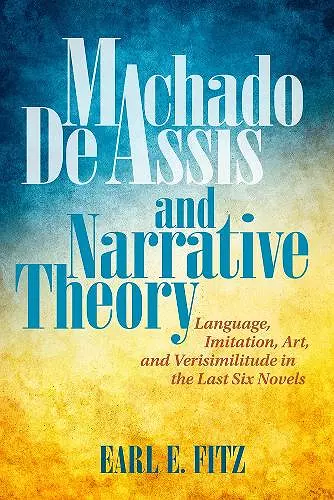Machado de Assis and Narrative Theory
Language, Imitation, Art, and Verisimilitude in the Last Six Novels
Format:Hardback
Publisher:Bucknell University Press,U.S.
Published:5th Jun '19
Currently unavailable, and unfortunately no date known when it will be back
This hardback is available in another edition too:
- Paperback£27.99(9781684481125)

This book makes the argument that Machado de Assis, hailed as one of Latin American literature’s greatest writers, was also a major theoretician of the modern novel form. Steeped in the works of Western literature and an imaginative reader of French Symbolist poetry, Machado creates, between 1880 and 1908, a “new narrative,” one that will presage the groundbreaking theories of Swiss linguist Ferdinand de Saussure by showing how even the language of narrative cannot escape being elusive and ambiguous in terms of meaning. It is from this discovery about the nature of language as a self-referential semiotic system that Machado crafts his “new narrative.” Long celebrated in Brazil as a dazzlingly original writer, Machado has struggled to gain respect and attention outside the Luso-Brazilian ken. He is the epitome of the “outsider” or “marginal,” the iconoclastic and wildly innovative genius who hails from a culture rarely studied in the Western literary hierarchy and so consigned to the status of “eccentric.” Had the Brazilian master written not in Portuguese but English, French, or German, he would today be regarded as one of the true exemplars of the modern novel, in expression as well as in theory.
Published by Bucknell University Press. Distributed worldwide by Rutgers University Press.
"Along with the translation of more works by Brazilian writers and scholars alike, books like Machado de Assis and Narrative Theory pave the way for the reception of literary works that, otherwise, remain regrettably off the radar even among many in academia."— Hispanic Review
Is Machado de Assis a theoretician of the novel? Earl Fitz’s book is a fascinating response to such a question. In this exciting journey through the writer’s late novels, we learn that Machado didn’t tell us what he was thinking; differently, he showed us the very act of thinking through language. It’s worth reading: Fitz’s passion for Machado is contagious.— Pedro Meira Monteiro, Arthur W. Marks ’19 Professor of Spanish and Portuguese, Princeton University
"[A] passionate and convincingly argued monograph...Fitz’s study makes a vital contribution to Machadoan criticism in that it highlights, perhaps more clearly, more forcefully, and in more detail than previously offered, the holistic view Machado came to embrace of narrative as a dynamic confluence of unstable signs capable of creating seemingly stable realities."— Hispania
"A masterwork of original and seminal scholarship that rescues a critically important Latin American writer from an undeserved obscurity."— Midwest Book Review
"Fitz’s study provides a strong argument for why scholars interested in narrative theory and form should give, if not renewed, then new attention to the work of Machado de Assis."— Bulletin of Spanish Studies
"Earl Fitz’s book should be appreciated as a complement to the many other excellent studies of Machado’s relation to a plentiful external landscape. Lest we become overly confident about our ability to know these realities, we should pause and, considering perspectives like those of this book, clean our glasses."— Journal of Lusophone Studies
"Earl E. Fitz advances the question of language as key to innovation and modernity in the mature works of Machado de Assis. Fitz attributes his departure from realism to a new awareness of the mutability, instability, self-referentiality and inescapable ambiguity of language in relation to meaning. What the novels are really about is not what they seem." — K. David Jackson, Yale University
ISBN: 9781684481132
Dimensions: 229mm x 152mm x 20mm
Weight: 454g
222 pages